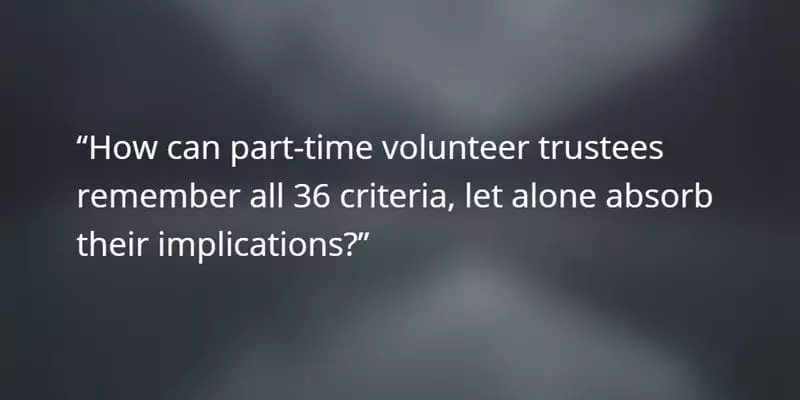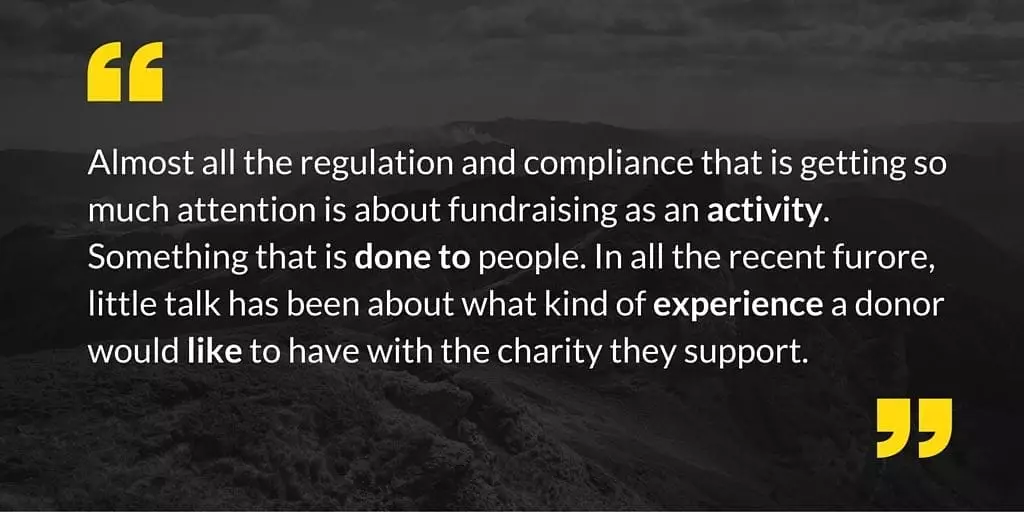Is this really what the relationship between trustees and fundraising should be about?
Fundraising in the UK is awash with talk of the Fundraising Preference Service, the ‘opt out’ button, and the Fundraising Regulator. What is this piece about?
The change in the role of trustees in fundraising.
How did it used to be?
Trustees would look at the numbers. Is income on target? Is expenditure being contained? If the numbers look good, and sometimes even when they don’t, if the director of fundraising looked convincing, many would ask no further questions. Fundraising generated the cash to enable the charity to deliver services.
Advertisement

And the future?
The fulcrum was the Etherington Review. In its 93 pages, one was devoted to the involvement of trustees in fundraising. The review said:
“Charity trustees and CEOs should have a strong governance framework in place so that they have strategic oversight of all fundraising undertaken on their behalf directly with the public or by third party agencies”
How could you disagree with that?
You couldn’t. Sir Stuart Etherington’s proposal is sensible, calm and balanced. If only people had read carefully what had been written.
So what’s the problem?
A lot of people have read more into the words than is there. A lot has been said, and written, that goes well beyond what was in Sir Stuart’s proposal. And so people are worried; especially trustees, who may have reason to be very concerned.
Trustee chairs have appeared before a parliamentary select committee, and been grilled.
Trustees have been told in no uncertain terms that they are responsible for fundraising.
Guidance is being re-written.
Trustees are having to re-think their role.
That must be good for avoiding bad practice in fundraising?
Not necessarily.
Trustees are thinking about how they comply with all their new duties regarding the fundraising process. They are not thinking about donors.
For example the Charity Commission has re-written the document CC20. ‘Charity fundraising: a guide to trustee duties’. A 31 page draft was circulated for consultation by 12th February. 31 pages, and a lot of links that seem to be mandatory reading. To be fair, the resulting changes to the guidance are not complete. However as it stands, a trustee, aware of the furore about trustee responsibilities, would take the 31 page document home, and read it carefully. If I were that trustee, within the 31 pages, the following words (among others, and taken from different parts of the document) would strike home with me.
- You and your co trustees are legally responsible for making sure that your charity’s fundraising is carried out in compliance with your legal trustee duties.
- When you and your co-trustees are planning your charity’s fundraising you should find out in advance which standards apply. You should make sure, or put systems in place to satisfy yourselves, that your charity complies with any standards which apply to its fundraising.
- Finding out about, and following, any recognised standards that apply to your charity’s fundraising. These are in the Code of Fundraising Practice. The code outlines both the legal rules that apply to fundraising and the standards designed to ensure that fundraising is open, honest and respectful. If your charity is a member of IOF or subscribes to the Fundraising Regulator you must comply with the standards in the code as a condition of your membership. The Commission expects all fundraising charities to fully comply with the code.
- You should find out if your charity is affected by new standards. You should make sure that your charity complies with them.
- In some cases you will be unable to comply with your legal duties if you don’t follow the good practice.
As if this isn’t scary enough, CC20 tries to be helpful. It gives a checklist of 36 separate criteria; things about which trustees must satisfy themselves.
Imagine you are that trustee. How might you react? Your role is part time and voluntary. You have a busy life in other fields and certainly don’t want to be held to account if you’ve missed anything of substance. Would you ask to see all mailings, DRTV, telephone scripts, on-line and other communications before they are sent out? Would you want to know what other fundraising takes place? In detail? You wouldn’t want to be caught out.
Surely, another safety net. To protect the donor?

How can part-time volunteer trustees remember all 36 criteria, let alone absorb their implications? Will they feel that they are required to approve individual pieces of fundraising material? How will they approve whatever fundraising material they see? They are likely to judge against two criteria:
- Is this the kind of communication they, and their friends, would find in good taste?
- Is the content sufficiently bland that it could not possibly fail against all the standards that will be in place? Real or imagined?
In either case the likely result is that communications will understate the need. Understate the possibility of a solution. Understate the effect a donor can have. Fail to make the donor feel special. Fail to connect the donor to the cause. You will have produced pap.
Oh dear!
It gets worse. This behaviour will raise far less money than a donor-centred approach. Potential beneficiaries will suffer. But trustees’ nerves will have been soothed.
Is this really what the relationship between trustees and fundraising should be about?
There must be an answer?
You don’t maximise income and inspire and delight donors by constructing layer upon layer of bureaucracy. You do so by enhancing the donor experience. And the best way trustees can do that is by talking to, and listening to, the charity’s donors.
Almost all the regulation and compliance that is getting so much attention is about fundraising as an activity. Something that is done to people. In all the recent furore, little talk has been about what kind of experience a donor would like to have with the charity they support.
Trustees should be thinking about the donor experience. About how to make donors feel special, how to involve them more deeply, increase income, and do more to help beneficiaries. Which is the purpose of charities.
Fundraising has to challenge, inspire, motivate and move emotionally. Not just ask for money. Donors will give more if they feel good.
So we ask the donors?
How many trustee boards have one or more trustees who are trustees because they are donors? Articulate, intelligent, and part of the lifeblood of the charity? I’m not talking about a £50,000 donor, but a £5-a-month donor. Actively committed to the cause. Passionate. Perhaps personally affected. Why should they not be involved in decision making? They will give a more accurate sense of appropriateness. Their views are likely to be more keenly felt.
How many trustee boards have donor panels? Donors whose advice can inform trustees’ decisions. Informing from their own experience of being a donor.
Has anyone considered a formal ‘donor sub-committee’ of the board of trustees? Alongside, and as important as, the finance sub-committee and the services sub-committee? To review all fundraising. (Fundraising that has happened, not part of the approval process.) They could advise fundraisers, and report to, and make recommendations to, the trustees. Now that could really add value.
A good senior fundraising team, or senior management team, or a working group of trustees, could come up with other ideas.
Of course donors should not have the final say. Their inputs and other inputs should be sifted. Intelligence should be applied to them. Fundraising is not just a profession or a science. Nor is it just an art; a process of crafting great communications. Neither is sufficient. Both are necessary. That is the appeals director’s job.
So what do you want readers to take away from this piece?
Trustees should focus on enhancing the donor experience. In doing this, trustees are as important as fundraisers and appeals directors.
© Giles Pegram 2016




